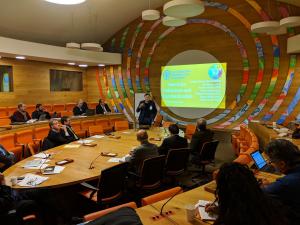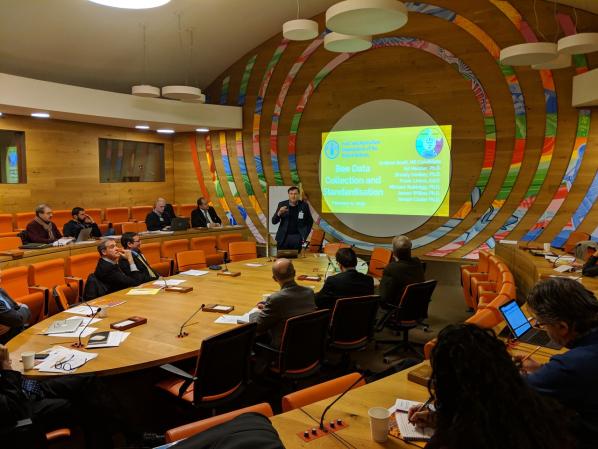In September 2015, The United Nations developed 17 sustainable development goals that could transform the world. In response, administrators in Appalachian State University’s Walker College of Business committed to upholding these goals in their work to educate students on global issues. Students and professors alike are working to contribute, including Dr. Joseph Cazier, a professor of analytics and information system, whose research on beekeeping is making an impact on a global scale.
The United Nations’ Food and Agriculture Organization (FAO) recently invited Dr. Cazier and his cohorts to their office in Rome, Italy to present their research on Open Apiary Management Systems. An apiary management system is a collection of software, sensors, data, knowledge, and best practices to help beekeepers and those that depend on them better manage their bees.
Bees are a critical key to food production, but the bee population has steeply declined in recent decades. Dr. Cazier believes that improved use of technology in beekeeping can dramatically change the situation.
“In today’s world it is hard to imagine an organization of any scale operating without some form of software and record keeping to assist,” said Dr. Cazier. “The better the records the better the organization can learn and grow over time, solidify best practices, and transfer learning to new branches of enterprise to scale.”
Bees serve as an integral part to the environment and the economy. Beekeepers are rural entrepreneurs, and beekeeping is important to meeting the U.N. sustainable development goals to reduce poverty, reduce hunger, and foster economic development. Bee health is the subject of one of many major projects ongoing in Appalachian's Center for Analytics Research and Education (CARE), a center Dr. Cazier directs.
Related: Analytics for Good: Saving the bees with Joseph Cazier
Beyond Appalachian, Dr. Cazier has worked with the Chilean Association of Organic Beekeepers to implement this software effectively. The aim of this is to accomplish the U.N.’s key goals and also increase the number of local beekeepers, or more specifically, the diversity among beekeepers. Having them each manage mixed operations that can share practices amongst each other will help the surrounding ecological system. On a global scale, a system like this could revolutionize the way people interact with fellow beekeepers and their methodologies of data collection.
Dr. Cazier is a leader in the field of analytics where he has published and worked in extensively including many grant funded projects in analytics. He has a keen interest in using analytics to build a better world, especially in the areas of education and sustainability. Dr. Cazier has previously served as the University of North Carolina System Fellow in Technology Commercialization and currently as the Chief Analytics Officer for Blowing Rock Software and their HiveTracks brand.
About the Center for Analytics Research and Education (CARE)
The Center for Analytics Research and Education (CARE) at Appalachian State University utilizes analytics to promote positive behavioral change in the world and do Analytics for Good. Housed in the Walker College of Business, the center enhances the reputation of the university by seeking out projects that have a positive impact on society and avoiding those that would have a negative impact. Big data is inherently interdisciplinary, and CARE faculty work to further research in the areas of sustainability, education, health and wellness, human resource science, and economic development, among others. Learn more at businesscare.appstate.edu.
April 4, 2019
Javon Nathaniel
BOONE, N.C.

